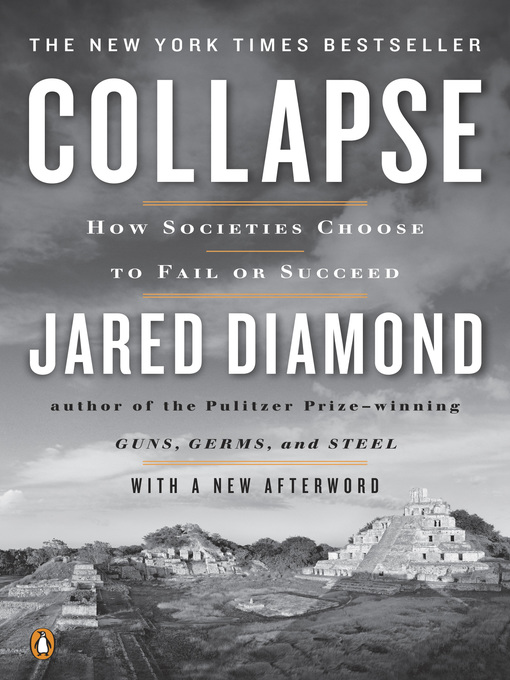
Collapse
How Societies Choose to Fail or Succeed: Revised Edition
فرمت کتاب
ebook
تاریخ انتشار
2011
Lexile Score
1460
Reading Level
12
نویسنده
Jared Diamondشابک
9781101502006
کتاب های مرتبط
- اطلاعات
- نقد و بررسی
- دیدگاه کاربران
نقد و بررسی

Starred review from November 15, 2004
In his Pulitzer Prize–winning bestseller Guns, Germs, and Steel
, geographer Diamond laid out a grand view of the organic roots of human civilizations in flora, fauna, climate and geology. That vision takes on apocalyptic overtones in this fascinating comparative study of societies that have, sometimes fatally, undermined their own ecological foundations. Diamond examines storied examples of human economic and social collapse, and even extinction, including Easter Island, classical Mayan civilization and the Greenland Norse. He explores patterns of population growth, overfarming, overgrazing and overhunting, often abetted by drought, cold, rigid social mores and warfare, that lead inexorably to vicious circles of deforestation, erosion and starvation prompted by the disappearance of plant and animal food sources. Extending his treatment to contemporary environmental trouble spots, from Montana to China to Australia, he finds today's global, technologically advanced civilization very far from solving the problems that plagued primitive, isolated communities in the remote past. At times Diamond comes close to a counsel of despair when contemplating the environmental havoc engulfing our rapidly industrializing planet, but he holds out hope at examples of sustainability from highland New Guinea's age-old but highly diverse and efficient agriculture to Japan's rigorous program of forest protection and, less convincingly, in recent green consumerism initiatives. Diamond is a brilliant expositor of everything from anthropology to zoology, providing a lucid background of scientific lore to support a stimulating, incisive historical account of these many declines and falls. Readers will find his book an enthralling, and disturbing, reminder of the indissoluble links that bind humans to nature. Photos. Agents, John Brockman and Katinka Matson.
(Jan.)
Forecast:
With a 12-city author tour and a 200,000-copy first printing, this BOMC main selection and History Book Club featured alternate is poised to compete with its ground-breaking predecessor.

February 7, 2005
In the Pulitzer–Prize–winning Guns, Germs, and Steel
, Diamond chronicled the rise of human civilizations since the Ice Age. This time, he turns over the log and probes the rotted side—the demise of once-productive societies such as the Maya, Easter Islanders and Greenland Norse. He also sounds the alarm on environmental practices undermining modern societies, including China, Russia, Australia and the United States. Narrator Murney has his work cut out for him, even though this audiobook is abridged. The narrative, which spans the globe and the ages, is dense, overwhelmingly so at times. Diamond parses myriad ecological, geographical and biological impacts, from weather patterns to deforestation to sperm count. But Murney rises to the occasion. His engagement never flags, and he strikes all the proper notes of concern and warning. The delivery feels effortless, his tone a blend of newsreel narrator and professor-at-the-lectern. Diamond teaches geography at UCLA, and his prose style, unsurprisingly, contains shades of the lecture hall. In fact, given such abundant and oft-alarming information, listeners may feel the urge to take notes for the final exam. Though grounding materials such as photographs and maps would have made this audiobook easier to follow, their absence is a minor fault in an overall fine production. Simultaneous release with the Viking hardcover (Forecasts, Nov. 15, 2004).

Stacey Brahm - Failed societies have several things in common: debt, misuse of natural resources, and unwillingness to make necessary adjustments to prevent disaster.

























دیدگاه کاربران